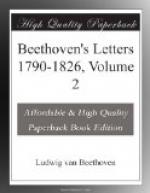Being now, however, finally settled here, and the welfare of the boy very precious to me, both love and duty demand that I should resume my rights; especially as this talented lad is coming to an age when greater care and expense must be bestowed on his education, on which his whole future prospects depend. This duty ought not to be confided to any woman, far less to his mother, who possesses neither the will nor the power to adopt those measures indispensable to a manly and suitable education.
I am the more anxious to reclaim my guardianship of Carl, as I understand that, in consequence of want of means to defray the expenses of the school where I placed him, he is to be removed, and his mother wishes him to live with her, in order herself to spend his trifling provision, and thus save the one half of her pension, which, according to the decree, she is bound to apply to his use.
I have hitherto taken a paternal charge of my nephew, and I intend to do the same in future at my own expense, being resolved that the hopes of his deceased father, and the expectations I have formed for this clever boy, shall be fulfilled by his becoming an able man and a good citizen.
With this view I accordingly request that the highly respected magistrates whom I now address will be pleased to annul the Town Sequestrator Nussboeck’s interim office, and forthwith transfer to me the sole guardianship of my nephew Carl van Beethoven.[2]
LUDWIG VAN BEETHOVEN.
[Footnote 1: Evidently drawn up by his advocate, Dr. Bach, from Beethoven’s notes.]
[Footnote 2: The magisterial decree of Nov. 4, 1819, was adverse to Beethoven.]
282.
TO F. RIES,—LONDON.
Vienna, Nov. 10, 1819.
DEAR RIES,—
I write to let you know that the Sonata is already out, though only a fortnight ago, and it is nearly six months since I sent you both the Quintet and the Sonata. In the course of a few days I will send them both to you engraved, and from them you can correct the two works.
Having received no letter from you on the subject, I thought the thing was at an end. I have indeed made shipwreck already with Neate this year! I only wish you could contrive to get me the fifty ducats which I have yet to receive, as I calculated on them, and really am in great want of money. I shall say no more to-day, but must inform you that I have nearly completed a new Grand Mass. Write to me whether you could do anything with this in London; but soon, very soon, and send the money soon also for both works. I will write more fully next time. In haste,
Your true and faithful friend,
BEETHOVEN.
283.
TO THE ARCHDUKE RUDOLPH.
Dec. 14, 1819.




